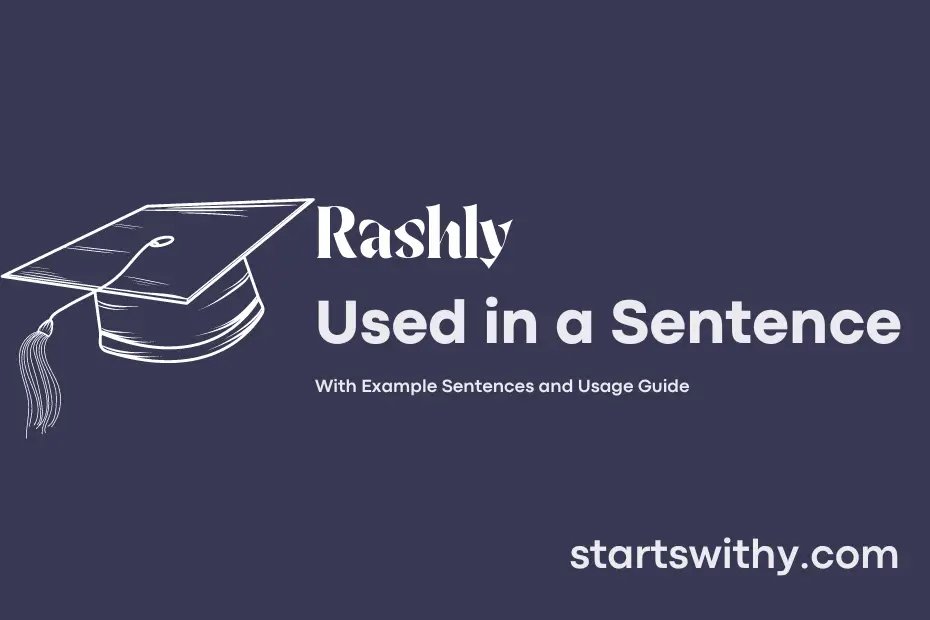Rashly means acting without careful consideration or thought. Making decisions or taking actions impulsively and without thinking through the potential consequences is often considered as acting rashly.
It is crucial to pause and evaluate situations before acting rashly, as such hasty decisions can lead to unwanted outcomes. Let’s explore how to avoid making rash decisions and instead approach situations with a more thoughtful mindset.
7 Examples Of Rashly Used In a Sentence For Kids
- Rashly running on wet floors can make you slip and fall.
- It’s not safe to rashly cross the road without looking both ways.
- We should never make decisions rashly without thinking first.
- Rashly touching hot objects can burn your skin.
- It’s important to think before speaking so we don’t say things rashly.
- Let’s always be careful and not act rashly when playing games.
- We should not rashly wander off without telling an adult where we are going.
14 Sentences with Rashly Examples
- Rashly quitting your part-time job without a backup plan can lead to financial struggles.
- It’s important not to rashly choose your major in college, take your time and make an informed decision.
- Rashly spending all your savings on unnecessary things can leave you in a difficult situation later on.
- Don’t rashly agree to group projects without assessing the workload and commitment required.
- Rashly signing up for too many extracurricular activities can negatively impact your academic performance.
- Avoid rashly making impulsive decisions about studying abroad without considering the financial implications.
- It’s best not to rashly skip classes, as it can affect your understanding of the subject matter.
- Rashly joining a club or organization without knowing their values and principles may lead to conflicts later on.
- Procrastinating and rashly cramming for exams the night before can harm your grades.
- Rashly discussing sensitive topics or making controversial statements in a classroom setting can create unnecessary tension.
- Before making a big purchase, think carefully about its necessity and don’t act rashly.
- Avoid rashly agreeing to take on more responsibilities than you can handle during the semester.
- Think twice before rashly changing your career goals or aspirations without proper reflection.
- It’s important not to rashly accept internship offers without researching the company and evaluating its benefits for your career.
How To Use Rashly in Sentences?
Rashly means to act or proceed with haste or without careful consideration.
When using Rashly in a sentence, it is important to convey a sense of impulsiveness or thoughtlessness in one’s actions. For example, “She rashly quit her job without having another one lined up.”
Here are a few guidelines on how to use Rashly effectively in a sentence:
-
Placement: Rashly is an adverb, so it is often placed before the verb in a sentence. For instance, “He rashly made a decision without thinking it through.”
-
Context: It is essential to provide context that highlights the impulsive or reckless nature of the action being described. This can help the reader understand the situation better. For example, “The driver rashly swerved in and out of traffic, endangering everyone on the road.”
-
Tone: When using Rashly, consider the tone of the sentence. It typically conveys a negative connotation, so make sure the context supports this interpretation. For instance, “She rashly spent all her savings on a whim.”
By following these guidelines, you can effectively incorporate Rashly into your writing to convey a sense of impulsiveness or lack of consideration in actions or decisions.
Conclusion
In making decisions or taking actions, it is crucial to avoid acting rashly, as doing so can lead to negative consequences. Some examples of sentences with “rashly” include: “He rashly quit his job without considering his financial situation” and “She acted rashly by confronting her boss without gathering all the facts first.” These sentences illustrate the potential dangers of acting impulsively without proper thought or consideration.
By pausing to think through the potential outcomes and consequences of our actions, we can avoid making hasty decisions that we may later regret. It is important to weigh our options carefully and consider the possible effects of our choices before acting rashly, as taking the time to make a well-thought-out decision can often lead to more positive outcomes in the long run.



